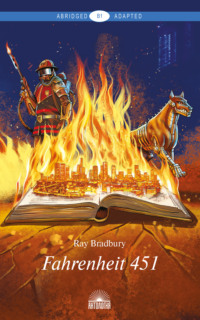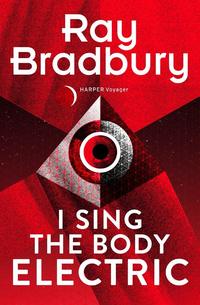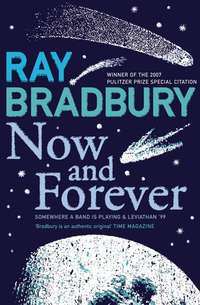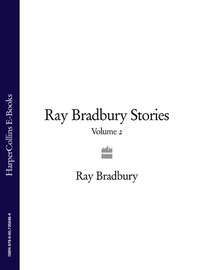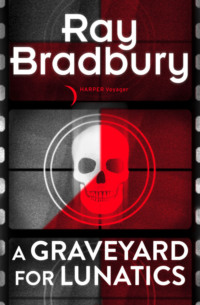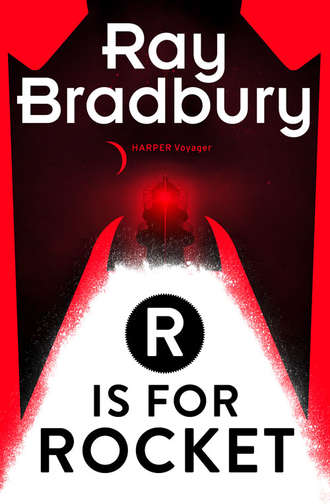
Полная версия
R is for Rocket
Half an hour passed with only a few whispers between us. When we grew tired waiting, McDunn began describing some of his ideas to me. He had some theories about the Fog Horn itself.
“One day many years ago a man walked along and stood in the sound of the ocean on a cold sunless shore and said, ‘We need a voice to call across the water, to warn ships; I’ll make one. I’ll make a voice like all of time and all of the fog that ever was; I’ll make a voice that is like an empty bed beside you all night long, and like an empty house when you open the door, and like trees in autumn with no leaves. A sound like the birds flying south, crying, and a sound like November wind and the sea on the hard, cold shore. I’ll make a sound that’s so alone that no one can miss it, that whoever hears it will weep in their souls, and hearths will seem warmer, and being inside will seem better to all who hear it in the distant towns. I’ll make me a sound and an apparatus and they’ll call it a Fog Horn and whoever hears it will know the sadness of eternity and the briefness of life.’”
The Fog Horn blew.
“I made up that story,” said McDunn quietly, “to try to explain why this thing keeps coming back to the lighthouse every year. The Fog Horn calls it, I think, and it comes.…”
“But—” I said.
“Sssst!” said McDunn. “There!” He nodded out to the Deeps.
Something was swimming toward the lighthouse tower.
It was a cold night, as I have said; the high tower was cold, the light coming and going, and the Fog Horn calling and calling through the raveling mist. You couldn’t see far and you couldn’t see plain, but there was the deep sea moving on its way about the night earth, flat and quiet, the color of gray mud, and here were the two of us alone in the high tower, and there, far out at first, was a ripple, followed by a wave, a rising, a bubble, a bit of froth. And then, from the surface of the cold sea came a head, a large head, dark-colored, with immense eyes, and then a neck. And then—not a body—but more neck and more! The head rose a full forty feet above the water on a slender and beautiful dark neck. Only then did the body, like a little island of black coral and shells and crayfish, drip up from the subterranean. There was a flicker of tail. In all, from head to tip of tail, I estimated the monster at ninety or a hundred feet.
I don’t know what I said. I said something.
“Steady, boy, steady,” whispered McDunn.
“It’s impossible!” I said.
“No, Johnny, we’re impossible. It’s like it always was ten million years ago. It hasn’t changed. It’s us and the land that’ve changed, become impossible. Us!”
It swam slowly and with a great dark majesty out in the icy waters, far away. The fog came and went about it, momentarily erasing its shape. One of the monster eyes caught and held and flashed back our immense light, red, white, red, white, like a disk held high and sending a message in primeval code. It was as silent as the fog through which it swam.
“It’s a dinosaur of some sort!” I crouched down, holding to the stair rail.
“Yes, one of the tribe.”
“But they died out!”
“No, only hid away in the Deeps. Deep, deep down in the deepest Deeps. Isn’t that a word now, Johnny, a real word, it says so much: the Deeps. There’s all the coldness and darkness and deepness in the world in a word like that.”
“What’ll we do?”
“Do? We got our job, we can’t leave. Besides, we’re safer here than in any boat trying to get to land. That thing’s as big as a destroyer and almost as swift.”
“But here, why does it come here?”
The next moment I had my answer.
The Fog Horn blew.
And the monster answered.
A cry came across a million years of water and mist. A cry so anguished and alone that it shuddered in my head and my body. The monster cried out at the tower. The Fog Horn blew. The monster roared again. The Fog Horn blew. The monster opened its great toothed mouth and the sound that came from it was the sound of the Fog Horn itself. Lonely and vast and far away. The sound of isolation, a viewless sea, a cold night, apartness. That was the sound.
“Now,” whispered McDunn, “do you know why it comes here?”
I nodded.
“All year long, Johnny, that poor monster there lying far out, a thousand miles at sea, and twenty miles deep maybe, biding its time, perhaps it’s a million years old, this one creature. Think of it, waiting a million years; could you wait that long? Maybe it’s the last of its kind. I sort of think that’s true. Anyway, here come men on land and build this lighthouse, five years ago. And set up their Fog Horn and sound it and sound it out toward the place where you bury yourself in sleep and sea memories of a world where there were thousands like yourself, but now you’re alone, all alone in a world not made for you, a world where you have to hide.
“But the sound of the Fog Horn comes and goes, comes and goes, and you stir from the muddy bottom of the Deeps, and your eyes open like the lenses of two-foot cameras and you move, slow, slow, for you have the ocean sea on your shoulders, heavy. But that Fog Horn comes through a thousand miles of water, faint and familiar, and the furnace in your belly stokes up, and you begin to rise, slow, slow. You feed yourself on great slakes of cod and minnow, on rivers of jellyfish, and you rise slow through the autumn months, through September when the fogs started, through October with more fog and the horn still calling you on, and then, late in November, after pressurizing yourself day by day, a few feet higher every hour, you are near the surface and still alive. You’ve got to go slow; if you surfaced all at once you’d explode. So it takes you all of three months to surface, and then a number of days to swim through the cold waters to the lighthouse. And there you are, out there, in the night, Johnny, the biggest damn monster in creation. And here’s the lighthouse calling to you, with a long neck like your neck sticking way up out of the water, and a body like your body, and, most important of all, a voice like your voice. Do you understand now, Johnny, do you understand?”
The Fog Horn blew.
The monster answered.
I saw it all, I knew it all—the million years of waiting alone, for someone to come back who never came back. The million years of isolation at the bottom of the sea, the insanity of time there, while the skies cleared of reptile-birds, the swamps dried on the continental lands, the sloths and sabertooths had their day and sank in tar pits, and men ran like white ants upon the hills.
The Fog Horn blew.
“Last year,” said McDunn, “that creature swam round and round, round and round, all night. Not coming too near, puzzled, I’d say. Afraid, maybe. And a bit angry after coming all this way. But the next day, unexpectedly, the fog lifted, the sun came out fresh, the sky was as blue as a painting. And the monster swam off away from the heat and the silence and didn’t come back. I suppose it’s been brooding on it for a year now, thinking it over from every which way.”
The monster was only a hundred yards off now, it and the Fog Horn crying at each other. As the lights hit them, the monster’s eyes were fire and ice, fire and ice.
“That’s life for you,” said McDunn. “Someone always waiting for someone who never comes home. Always someone loving some thing more than that thing loves them. And after a while you want to destroy whatever that thing is, so it can’t hurt you no more.”
The monster was rushing at the lighthouse.
The Fog Horn blew.
“Let’s see what happens,” said McDunn.
He switched the Fog Horn off.
The ensuing minute of silence was so intense that we could hear our hearts pounding in the glassed area of the tower, could hear the slow greased turn of the light.
The monster stopped and froze. Its great lantern eyes blinked. Its mouth gaped. It gave a sort of rumble, like a volcano. It twitched its head this way and that, as if to seek the sounds now dwindled off into the fog. It peered at the lighthouse. It rumbled again. Then its eyes caught fire. It reared up, threshed the water, and rushed at the tower, its eyes filled with angry torment.
“McDunn!” I cried. “Switch on the horn!”
McDunn fumbled with the switch. But even as he flicked it on, the monster was rearing up. I had a glimpse of its gigantic paws, fishskin glittering in webs between the fingerlike projections, clawing at the tower. The huge eye on the right side of its anguished head glittered before me like a caldron into which I might drop, screaming. The tower shook. The Fog Horn cried; the monster cried. It seized the tower and gnashed at the glass, which shattered in upon us.
McDunn seized my arm. “Downstairs!”
The tower rocked, trembled, and started to give. The Fog Horn and the monster roared. We stumbled and half fell down the stairs. “Quick!”
We reached the bottom as the tower buckled down toward us. We ducked under the stairs into the small stone cellar. There were a thousand concussions as the rocks rained down; the Fog Horn stopped abruptly. The monster crashed upon the tower. The tower fell. We knelt together, McDunn and I, holding tight, while our world exploded.
Then it was over, and there was nothing but darkness and the wash of the sea on the raw stones.
That and the other sound.
“Listen,” said McDunn quietly. “Listen.”
We waited a moment. And then I began to hear it. First a great vacuumed sucking of air, and then the lament, the bewilderment, the loneliness of the great monster, folded over and upon us, above us, so that the sickening reek of its body filled the air, a stone’s thickness away from our cellar. The monster gasped and cried. The tower was gone. The light was gone. The thing that had called to it across a million years was gone. And the monster was opening its mouth and sending out great sounds. The sounds of a Fog Horn, again and again. And ships far at sea, not finding the light, not seeing anything, but passing and hearing late that night, must’ve thought: There it is, the lonely sound, the Lonesome Bay horn. All’s well. We’ve rounded the cape.
And so it went for the rest of that night.
The sun was hot and yellow the next afternoon when the rescuers came out to dig us from our stoned-under cellar.
“It fell apart, is all,” said Mr. McDunn gravely. “We had a few bad knocks from the waves and it just crumbled.” He pinched my arm.
There was nothing to see. The ocean was calm, the sky blue. The only thing was a great algaic stink from the green matter that covered the fallen tower stones and the shore rocks. Flies buzzed about. The ocean washed empty on the shore.
The next year they built a new lighthouse, but by that time I had a job in the little town and a wife and a good small warm house that glowed yellow on autumn nights, the doors locked, the chimney puffing smoke. As for McDunn, he was master of the new lighthouse, built to his own specifications, out of steel-reinforced concrete. “Just in case,” he said.
The new lighthouse was ready in November. I drove down alone one evening late and parked my car and looked across the gray waters and listened to the new horn sounding, once, twice, three, four times a minute far out there, by itself.
The monster?
It never came back.
“It’s gone away,” said McDunn. “It’s gone back to the Deeps. It’s learned you can’t love anything too much in this world. It’s gone into the deepest Deeps to wait another million years. Ah, the poor thing! Waiting out there, and waiting out there, while man comes and goes on this pitiful little planet. Waiting and waiting.”
I sat in my car, listening. I couldn’t see the lighthouse or the light standing out in Lonesome Bay. I could only hear the Horn, the Horn, the Horn. It sounded like the monster calling.
I sat there wishing there was something I could say.
The Rocket
Many nights Fiorello Bodoni would awaken to hear the rockets sighing in the dark sky. He would tiptoe from bed, certain that his kind wife was dreaming, to let himself out into the night air. For a few moments he would be free of the smells of old food in the small house by the river. For a silent moment he would let his heart soar alone into space, following the rockets.
Now, this very night, he stood half naked in the darkness, watching the fire fountains murmuring in the air. The rockets on their long wild way to Mars and Saturn and Venus!
“Well, well, Bodoni.”
Bodoni started.
On a milk crate, by the silent river, sat an old man who also watched the rockets through the midnight hush.
“Oh, it’s you, Bramante!”
“Do you come out every night, Bodoni?”
“Only for the air.”
“So? I prefer the rockets myself,” said old Bramante. “I was a boy when they started. Eighty years ago, and I’ve never been on one yet.”
“I will ride up in one someday,” said Bodoni.
“Fool!” cried Bramante. “You’ll never go. This is a rich man’s world.” He shook his gray head, remembering. “When I was young they wrote it in fiery letters: THE WORLD OF THE FUTURE! Science, Comfort, and New Things for All! Ha! Eighty years. The Future becomes Now! Do we fly rockets? No! We live in shacks like our ancestors before us.”
“Perhaps my sons—” said Bodoni.
“No, nor their sons!” the old man shouted. “It’s the rich who have dreams and rockets!”
Bodoni hesitated. “Old man, I’ve saved three thousand dollars. It took me six years to save it. For my business, to invest in machinery. But every night for a month now I’ve been awake. I hear the rockets. I think. And tonight I’ve made up my mind. One of us will fly to Mars!” His eyes were shining and dark.
“Idiot,” snapped Bramante. “How will you choose? Who will go? If you go, your wife will hate you, for you will be just a bit nearer God, in space. When you tell your amazing trip to her, over the years, won’t bitterness gnaw at her?”
“No, no!”
“Yes! And your children? Will their lives be filled with the memory of Papa, who flew to Mars while they stayed here? What a senseless task you will set your boys. They will think of the rocket all their lives. They will lie awake. They will be sick with wanting it. Just as you are sick now. They will want to die if they cannot go. Don’t set that goal, I warn you. Let them be content with being poor. Turn their eyes down to their hands and to your junkyard, not up to the stars.”
“But—”
“Suppose your wife went? How would you feel, knowing she had seen and you had not? She would become holy. You would think of throwing her in the river. No, Bodoni, buy a new wrecking machine, which you need, and pull your dreams apart with it, and smash them to pieces.”
The old man subsided, gazing at the river in which, drowned, images of rockets burned down the sky.
“Good night,” said Bodoni.
“Sleep well,” said the other.
When the toast jumped from its silver box, Bodoni almost screamed. The night had been sleepless. Among his nervous children, beside his mountainous wife, Bodoni had twisted and stared at nothing. Bramante was right. Better to invest the money. Why save it when only one of the family could ride the rocket, while the others remained to melt in frustration?
“Fiorello, eat your toast,” said his wife, Maria.
“My throat is shriveled,” said Bodoni.
The children rushed in, the three boys fighting over a toy rocket, the two girls carrying dolls which duplicated the inhabitants of Mars, Venus, and Neptune, green mannequins with three yellow eyes and twelve fingers.
“I saw the Venus rocket!” cried Paolo.
“It took off, whoosh!” hissed Antonello.
“Children!” shouted Bodoni, hands to his ears.
They stared at him. He seldom shouted.
Bodoni arose. “Listen, all of you,” he said. “I have enough money to take one of us on the Mars rocket.”
Everyone yelled.
“You understand?” he asked. “Only one of us. Who?”
“Me, me, me!” cried the children.
“You,” said Maria.
“You,” said Bodoni to her.
They all fell silent.
The children reconsidered. “Let Lorenzo go—he’s oldest.”
“Let Miriamne go—she’s a girl!”
“Think what you would see,” said Bodoni’s wife to him. But her eyes were strange. Her voice shook. “The meteors, like fish. The universe. The Moon. Someone should go who could tell it well on returning. You have a way with words.”
“Nonsense. So have you,” he objected.
Everyone trembled.
“Here,” said Bodoni unhappily. From a broom he broke straws of various lengths. “The short straw wins.” He held out his tight fist. “Choose.”
Solemnly each took his turn.
“Long straw.”
“Long straw.”
Another.
“Long straw.”
The children finished. The room was quiet.
Two straws remained. Bodoni felt his heart ache in him. “Now,” he whispered. “Maria.”
She drew.
“The short straw,” she said.
“Ah,” sighed Lorenzo, half happy, half sad. “Mama goes to Mars.”
Bodoni tried to smile. “Congratulations. I will buy your ticket today.”
“Wait, Fiorello—”
“You can leave next week,” he murmured.
She saw the sad eyes of her children upon her, with the smiles beneath their straight, large noses. She returned the straw slowly to her husband. “I cannot go to Mars.”
“But why not?”
“I will be busy with another child.”
“What!”
She would not look at him. “It wouldn’t do for me to travel in my condition.”
He took her elbow. “Is this the truth?”
“Draw again. Start over.”
“Why didn’t you tell me before?” he said incredulously.
“I didn’t remember.”
“Maria, Maria,” he whispered, patting her face. He turned to the children. “Draw again.”
Paolo immediately drew the short straw.
“I go to Mars!” He danced wildly. “Thank you, Father!”
The other children edged away. “That’s swell, Paolo.”
Paolo stopped smiling to examine his parents and his brothers and sisters. “I can go, can’t I?” he asked uncertainly.
“Yes.”
“And you’ll like me when I come back?”
“Of course.”
Paolo studied the precious broomstraw on his trembling hand and shook his head. He threw it away. “I forgot. School starts. I can’t go. Draw again.”
But no one would draw. A full sadness lay on them.
“None of us will go,” said Lorenzo.
“That’s best,” said Maria.
“Bramante was right,” said Bodoni.
With his breakfast curdled within him, Fiorello Bodoni worked in his junkyard, ripping metal, melting it, pouring out usable ingots. His equipment flaked apart; competition had kept him on the insane edge of poverty for twenty years.
It was a very bad morning.
In the afternoon a man entered the junkyard and called up to Bodoni on his wrecking machine. “Hey, Bodoni, I got some metal for you!”
“What is it, Mr. Mathews?” asked Bodoni, listlessly.
“A rocket ship. What’s wrong? Don’t you want it?”
“Yes, yes!” He seized the man’s arm, and stopped, bewildered.
“Of course,” said Mathews, “it’s only a mockup. You know. When they plan a rocket they build a full-scale model first, of aluminum. You might make a small profit boiling her down. Let you have her for two thousand—”
Bondoni dropped his hand. “I haven’t the money.”
“Sorry. Thought I’d help you. Last time we talked you said how everyone outbid you on junk. Thought I’d slip this to you on the q.t. Well—”
“I need new equipment. I saved money for that.”
“I understand.”
“If I bought your rocket, I wouldn’t even be able to melt it down. My aluminum furnace broke down last week—”
“Sure.”
“I couldn’t possibly use the rocket if I bought it from you.”
“I know.”
Bodoni blinked and shut his eyes. He opened them and looked at Mr. Mathews. “But I am a great fool. I will take my money from the bank and give it to you.”
“But if you can’t melt the rocket down—”
“Deliver it,” said Bodoni.
“All right, if you say so. Tonight?”
“Tonight,” said Bodoni, “would be fine. Yes, I would like to have a rocket ship tonight.”
There was a moon. The rocket was white and big in the junkyard. It held the whiteness of the moon and the blueness of the stars. Bodoni looked at it and loved all of it. He wanted to pet it and lie against it, pressing it with his cheek, telling it all the secret wants of his heart.
He stared up at it. “You are all mine,” he said. “Even if you never move or spit fire, and just sit there and rust for fifty years, you are mine.”
The rocket smelled of time and distance. It was like walking into a clock. It was finished with Swiss delicacy. One might wear it on one’s watch fob. “I might even sleep here tonight,” Bodoni whispered excitedly.
He sat in the pilot’s seat.
He touched a lever.
He hummed in his shut mouth, his eyes closed.
The humming grew louder, louder, higher, higher, wilder, stranger, more exhilarating, trembling in him and leaning him forward and pulling him and the ship in a roaring silence and in a kind of metal screaming, while his fists flew over the controls, and his shut eyes quivered, and the sound grew and grew until it was a fire, a strength, a lifting and a pushing of power that threatened to tear him in half. He gasped. He hummed again and again, and did not stop, for it could not be stopped, it could only go on, his eyes tighter, his heart furious. “Taking off!” he screamed. The jolting concussion! The thunder! “The Moon!” he cried, eyes blind, tight. “The meteors!” The silent rush in volcanic light. “Mars. Oh, Yes! Mars! Mars!”
He fell back, exhausted and panting. His shaking hands came loose of the controls and his head tilted wildly. He sat for a long time, breathing out and in, his heart slowing.
Slowly, slowly, he opened his eyes.
The junkyard was still there.
He sat motionless. He looked at the heaped piles of metal for a minute, his eyes never leaving them. Then, leaping up, he kicked the levers. “Take off, blast you!”
The ship was silent.
“I’ll show you!” he cried.
Out in the night air, stumbling, he started the fierce motor of his terrible wrecking machine and advanced upon the rocket. He maneuvered the massive weights into the moonlit sky. He readied his trembling hands to plunge the weights, to smash, to rip apart this insolently false dream, this silly thing for which he had paid his money, which would not move, which would not do his bidding. “I’ll teach you!” he shouted.
But his hand stayed.
The silver rocket lay in the light of the moon. And beyond the rocket stood the yellow lights of his home, a block away, burning warmly. He heard the family radio playing some distant music. He sat for half an hour considering the rocket and the house lights, and his eyes narrowed and grew wide. He stepped down from the wrecking machine and began to walk, and as he walked he began to laugh, and when he reached the back door of his house he took a deep breath and called, “Maria, Maria, start packing. We’re going to Mars!”
“Oh!”
“Ah!”
“I can’t believe it!”
“You will, you will.”
The children balanced in the windy yard, under the glowing rocket, not touching it yet. They started to cry.
Maria looked at her husband. “What have you done?” she said. “Taken our money for this? It will never fly.”
“It will fly,” he said, looking at it.
“Rocket ships cost millions. Have you millions?”
“It will fly,” he repeated steadily. “Now, go to the house, all of you. I have phone calls to make, work to do. Tomorrow we leave! Tell no one, understand? It is a secret.”
The children edged off from the rocket, stumbling. He saw their small, feverish faces in the house windows, far away.



